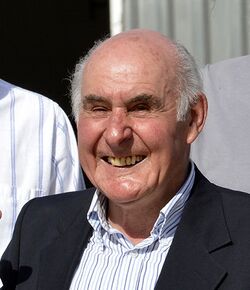Biography:Augusto Cicaré
Augusto Ulderico Cicaré (25 May 1937 – 26 January 2022) was an Argentinian inventor, engineer, and aviation designer.[1]
At the age of 11, still in 5th grade, he built his first four stroke engine that he used to drive a washing machine. In this same period he converted the engine of a car to use propane gas instead of petrol.[2] By age 15 he was constructing motorcycle engines.[3]
In 1958, despite having never seen an actual helicopter before, and knowing little of helicopter design,[4] Cicaré's first successful helicopter design, the CH-1, flew for the first time, with its designer as the test pilot,[3] teaching himself how to fly in the process.[4] The CH-1 was the first helicopter to have been designed and built in South America. By 1972, Cicaré was developing his third helicopter.[5]
In the late 1960s, Cicaré designed a V-4 engine for use in DKW automobiles, the engine being extensively tested by driver Juan Manuel Fangio.[3] A version of the engine for use in motorsports competition was also developed, but the closure of DKW resulted in the termination of the project.[3]
Cicaré continued to be active in aviation design, with some of his later work including the Cicaré CH-10 and CH-11 ultralight helicopters, and the development of the Cicaré SVH-3 flight simulator, which was declared Argentina's national invention of the year in 1998.[3]
He died in Saladillo, Buenos Aires on 26 January 2022, at the age of 84.[6]
Awards
A 1987 design for a fuel injection pump for Diesel engines resulted in Cicaré being awarded the Juan Manuel Fangio Prize, the highest award for Argentine inventors.[3]
In 1970, Cicaré was declared to be one of the ten most outstanding young men of Argentina, and in 1996 he was named as a Friend of the Argentine Air Force .[3] Cicaré also received an honorary Air and Space Engineer degree in 1997 from the Professional Council of Air and Space Engineering.[3]
In 1999, a roundabout in Saladillo, Argentina was named in Cicaré's honour.[3]
See also
- Cicaré Helicópteros
- Cicaré CK.1
- Cicaré CH-12
- Cicaré CH-16
- Heli-Sport CH-7
- Revolution Helicopter Corporation
References
- Notes
- ↑ Cristófalo, Carlos (26 January 2022). "Adiós a Augusto "Pirincho" Cicaré: falleció el genio de los helicópteros argentinos". motor1.com. https://ar.motor1.com/news/563244/augusto-pirincho-cicare/.
- ↑ Merola, Daniel (8 June 2015). "El mago de los helicópteros inventa y fabrica en Saladillo". ABC Saladillo. Archived from the original on 4 March 2016. https://web.archive.org/web/20160304214421/http://www.abcsaladillo.com.ar/saladillo/informacion-general/el-mago-de-los-helicopteros-inventa-y-fabrica-en-saladilllo.
- ↑ 3.0 3.1 3.2 3.3 3.4 3.5 3.6 3.7 3.8 Augusto Cicaré , Cicaré Helicopters. Accessed 28 October 2010.
- ↑ 4.0 4.1 Rotary Revolution Flightglobal.com, 22 October 2000. Accessed 28 October 2010.
- ↑ Jane's 1971–1972, p. 3
- ↑ "Adiós a Augusto "Pirincho" Cicaré: falleció el genio de los helicópteros argentinos". Motor 1. 26 January 2022. https://ar.motor1.com/news/563244/augusto-pirincho-cicare/.
- Bibliography
- Taylor, John W.R. (ed.) Jane's All The World's Aircraft 1971–1972. London: Sampson Low Marston & Co, 1972. ISBN:978-0-354-00094-9.
 |


